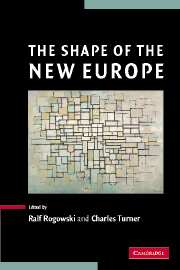Book contents
- Frontmatter
- Contents
- List of Contributors
- Acknowledgements
- 1 Europe: Law, Politics, History, Culture
- Part I Constitutionality and Political Participation
- Part II European Polity and European Civil Society
- Part III European History and European Culture
- 6 Plaidoyer pour l'Europe des Patries
- 7 Europe Becoming: The Civilisational Consequences of Enlargement
- 8 Gaia and Europa: Religion and Legitimation Crisis in the ‘New Europe’
- 9 A Postnational Council of Isles? The British–Irish Conflict Reconsidered
- Part IV Europe and The World
- Index
- References
7 - Europe Becoming: The Civilisational Consequences of Enlargement
Published online by Cambridge University Press: 22 September 2009
- Frontmatter
- Contents
- List of Contributors
- Acknowledgements
- 1 Europe: Law, Politics, History, Culture
- Part I Constitutionality and Political Participation
- Part II European Polity and European Civil Society
- Part III European History and European Culture
- 6 Plaidoyer pour l'Europe des Patries
- 7 Europe Becoming: The Civilisational Consequences of Enlargement
- 8 Gaia and Europa: Religion and Legitimation Crisis in the ‘New Europe’
- 9 A Postnational Council of Isles? The British–Irish Conflict Reconsidered
- Part IV Europe and The World
- Index
- References
Summary
The Eastern enlargement of the European Union (EU) has important implications for our understanding of the meaning of Europe. Although the precise nature of this process is uncertain, the very fact that it is underway is in itself of major significance. Indeed the very term integration may be inadequate when it comes to the current scale of Europeanisation, which consists not of one but several logics and not all of which can be understood in terms of integration. Europeanisation is not leading to a society, a state or a clearly definable geopolitical entity that rests on a cultural foundation, as is often assumed. Moreover, there is not one ‘Europe’, but several. In this respect, what is central is the question of modernity, or modernities and their civilisational forms.
The categories that are used to make sense of Europeanisation tend on the whole to be either descriptive or normative – ‘widening’, ‘deepening’, ‘integration’, ‘convergence’ – and thus fail to appreciate the dynamics of a multi-directional process. There is relatively little theoretical literature exploring the wider significance of the Eastern enlargement, which is generally seen only in terms of intergovernmentalism and of institutional design. The constitutional debate instigated by the Convention on the Future of Europe in February 2002 has, to a degree, opened a wider perspective on the emerging face of a bigger Europe, but the issues at stake go beyond what can be addressed by a constitution.
- Type
- Chapter
- Information
- The Shape of the New Europe , pp. 125 - 145Publisher: Cambridge University PressPrint publication year: 2006
References
- 3
- Cited by



